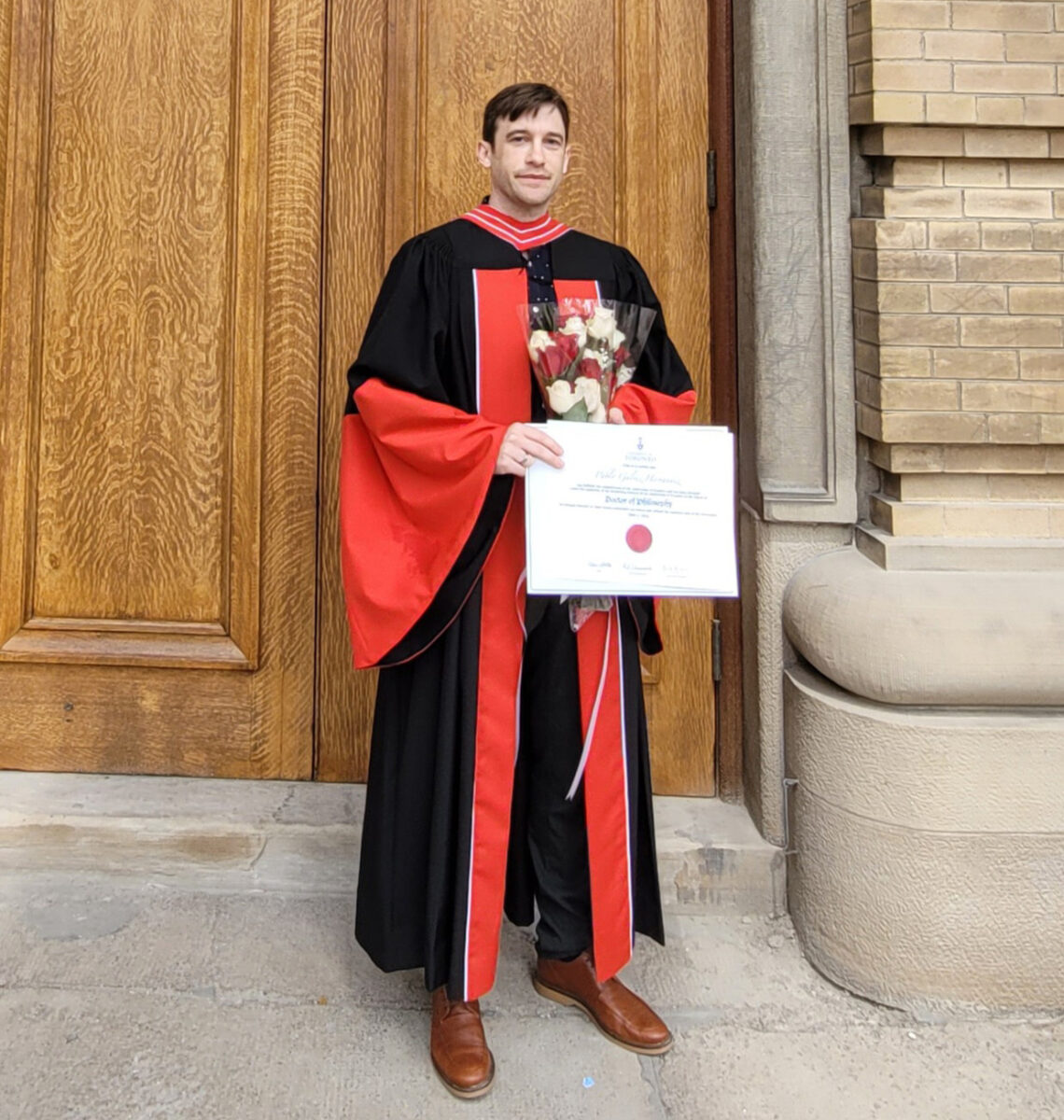Pablo (Pau) Galvez Hernandez had no idea when he stepped on a plane in early 2019 in pursuit of his doctoral degree at the University of Toronto, that he would navigate such a series of highs and lows over the next four years.
From experiencing a global pandemic, to meeting his future wife, all while developing research to improve population health in Spain, Galvez Hernandez admits it has been both a difficult and memorable journey.
“The first year of my PhD journey was very difficult. When the pandemic was announced, I was without family and friends, I had relatives who passed away back in Spain during this time, and without a social network to rely on it was challenging,” recalls Galvez Hernandez.
Originally from Catalonia Spain, on June 5, Galvez Hernandez crossed the stage as a newly minted PhD graduate from the Lawrence Bloomberg Faculty of Nursing with a collaborative specialization in health services and policy research from the Institute of Health Policy, Management and Evaluation at the Dalla Lana School of Public Health.

Despite the challenges, Galvez Hernandez has also seen more than a few happy moments. He found a sense of community at U of T Grad House, met his current wife, a fellow PhD student, and he has developed a keen sense of resilience that he says has served him well throughout his research process.
His passion for primary care and population health and the social interventions that can aid in improving the lives of many, are at the crux of his doctoral research.
Galvez Hernandez has examined and evaluated closely the impact of social isolation, loneliness, and the availability of interventions involving primary care to combat subsequent health impacts, among older adults in his home region of Catalonia Spain.
Increasing life expectancy Galvez Hernandez says, is one of the many contributing factors to a growing need to address social isolation in older adults. The loss of significant social connections as individuals age, including those with a spouse, child, or friends, as well as functional and cognitive decline in older adults can contribute to these social problems.
“Social determinants of health, also play a significant role. Poorer neighbourhoods, which often have less transportation infrastructure, and funding for social programs also lead to more social isolation among older adults,” says Galvez Hernandez.
According to a WHO report published in 2023, social isolation and loneliness has a health impact comparable to cigarette smoking and obesity in terms of life expectancy. It is one of the many reasons Galvez Hernandez sees an urgent need to address the issue.
“I knew it was integral that we understand how health systems could deliver more comprehensive responses to address these particular issues, and how collaboration between primary care, government, neighbourhood associations and other social networks could enhance equity in access to such responses,” says Galvez Hernandez.
As part of his dissertation Galvez Hernandez examined the implementation and access to resources and interventions in local municipalities globally . Some of these interventions included pathways connecting primary care to social activities such as group handcrafts, theater, cooking and choir courses, or conversation groups focused on shared-interest topics. Other types of initiatives included group physical activity such as walking groups and physical activities in outdoor park gyms.
Under the supervision of Carles Muntaner, a professor at the Lawrence Bloomberg Faculty of Nursing and a world-renowned researcher in the field of social epidemiology and health equity, Galvez Hernandez found that across a population of 7 million people in Catalonia, there was an inequitable distribution of these types of social interventions for older adults despite a regional policy. In some areas, zero initiatives were available while in other jurisdictions with higher incomes, upwards of 300 initiatives were available to older adults.
“I believe there should be monitoring systems in place to ensure equitable distribution of these initiatives across all territories so that everyone can benefit from a public health perspective. In areas where there were found to be a higher number of initiatives, older adults had higher levels of social support and mental wellbeing,” says Galvez Hernandez.
He is hopeful that a greater interest in the number of researchers examining the impacts of social isolation will lead to future changes. For Galvez Hernandez, the issue also hits particularly close to home.
As the youngest of five siblings, he has seen first-hand the impact that diminishing social relationship can have on older adults, including his own parents. After leaving for Canada to pursue his PhD he witnessed how challenging it was especially for his mother, to become acclimated to their new reality.
“This really solidified for me the importance of addressing this issue for older adults and its impact on their overall health and longevity,” says Galvez Hernandez.
He is now hoping that his work will help researchers evaluate the uptake of policies and programs in these regions, and provide policy makers with a better understanding of the importance of intersectional collaboration to implement them. Galvez Hernandez’s research expertise is now being called upon to evaluate primary care with a focus on team-based models in Ontario and other provinces. He has secured a post-doctoral fellowship with the Institute of Health Policy, Management and Evaluation at the Dalla Lana School of Public Health, and will be evaluating the growth and sustainability of Ontario health team models, including their impact, on population health outcomes.
